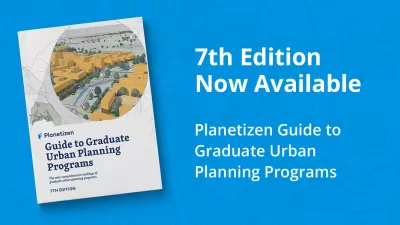The PAB is proposing a substantial revision of the standards and criteria for accreditation of university planning programs. A public comment period on the proposal has just opened and lasts through 15 December. Here's what PAB says about the changes: "PAB is pleased to introduce a comprehensive revision of its accreditation standards and criteria. The goals of the change process include:
The PAB is proposing a substantial revision of the standards and
criteria for accreditation of university planning programs. A public
comment period on the proposal has just opened and lasts through 15
December. Here's what PAB says about the changes:
"PAB is pleased to introduce a comprehensive revision of its accreditation standards and criteria. The goals of the change process include:
- Developing standards, processes, and guidelines that are coherent,
consistent, and sustainable through PAB leadership and membership
changes; - Creating a clear and thoughtful framework that focuses on principles, outcomes, and accountability; and
- Reducing the number standards to avoid redundancy and inconsistency, streamline the requirements, and promote simplicity.
Material improvements include:
- A reduction in the number of standards from 11 to 7, and in
criteria from from 81 to to 32; elimination of redundancy; emphasis on
outcomes over inputs; - Leadership and trends in planning added to curriculum;
- Programmatic outcomes replace student [learning] outcomes; and
Universal outcomes identified and required on websites."
The proposed standards are shown and comments may be submitted at: http://www.planningaccreditationboard.org/index.php?id=134. Alternatively, you can download a PDF version of the
proposed standards and submit comments via email to [email protected],
or regular mail to PAB at 53 W.
Jackson Blvd – Suite 1315; Chicago, IL 60604. Comments
submitted in either manner will also be made available on the PAB
website, accompanied by the names of those who submit.

Planetizen Federal Action Tracker
A weekly monitor of how Trump’s orders and actions are impacting planners and planning in America.

Restaurant Patios Were a Pandemic Win — Why Were They so Hard to Keep?
Social distancing requirements and changes in travel patterns prompted cities to pilot new uses for street and sidewalk space. Then it got complicated.

Map: Where Senate Republicans Want to Sell Your Public Lands
For public land advocates, the Senate Republicans’ proposal to sell millions of acres of public land in the West is “the biggest fight of their careers.”

Maui's Vacation Rental Debate Turns Ugly
Verbal attacks, misinformation campaigns and fistfights plague a high-stakes debate to convert thousands of vacation rentals into long-term housing.

San Francisco Suspends Traffic Calming Amidst Record Deaths
Citing “a challenging fiscal landscape,” the city will cease the program on the heels of 42 traffic deaths, including 24 pedestrians.

California Homeless Arrests, Citations Spike After Ruling
An investigation reveals that anti-homeless actions increased up to 500% after Grants Pass v. Johnson — even in cities claiming no policy change.
Urban Design for Planners 1: Software Tools
This six-course series explores essential urban design concepts using open source software and equips planners with the tools they need to participate fully in the urban design process.
Planning for Universal Design
Learn the tools for implementing Universal Design in planning regulations.
Heyer Gruel & Associates PA
JM Goldson LLC
Custer County Colorado
City of Camden Redevelopment Agency
City of Astoria
Transportation Research & Education Center (TREC) at Portland State University
Camden Redevelopment Agency
City of Claremont
Municipality of Princeton (NJ)






























